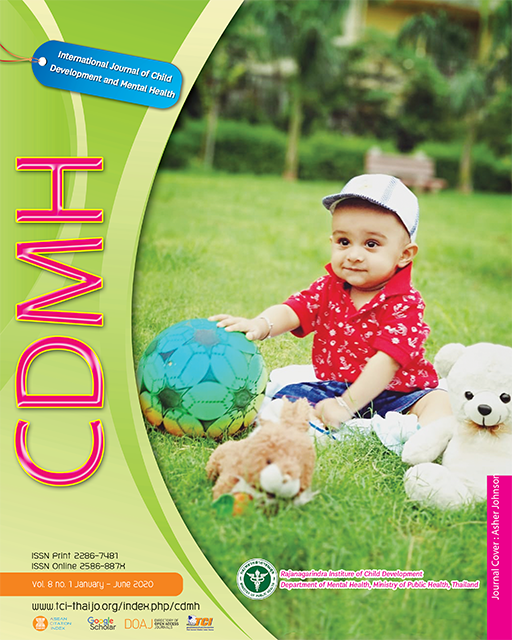A Behavioral Modification Program for the Development of Critical Thinking on Heterosexual Relationships Among Early Adolescents Development of behavioral modification program
Main Article Content
Abstract
This mixed methods research aimed to study the critical thinking on Heterosexual Relationship of young adolescents in order to develop a behavioral modification program of critical thinking on heterosexual relationship among early adolescents and to examine the effects of the behavioral modification program of critical thinking on heterosexual relationship among early adolescents. This study was divided into two phases. The first phase had thirteen people involved and the second phase had forty participants who were qualified to join the study. The results of the study were as follow: the results of the definition of critical thinking on heterosexual relationship behavior was reflective thinking on a good future before engaging in heterosexual activities. Furthermore, this findings showed that there were four factors of critical thinking on heterosexual relationships separated into two internal conditions: attitude toward heterosexual relationship, and self-control; two external conditions: parents providing reason for education, and learning from role models. The results of the behavioral modification program in the second phase was that after participating in the program, the students who participated in the program had higher level of critical thinking on heterosexual relationship behavior than students who did not participated in the program significantly at .05 level of confidence. The program might be useful for developing the critical thinking on heterosexual relationships. However, the author also suggested that the results of the behavioral modification program in this study is based on the skills in Thai reading and writing. Thus, skills in Thai reading and writing of the participants should be taken to considerations.
Article Details
![]()
Creative Commons License
This work is licensed under a Creative Commons Attribution-NonCommercial-No Derivatives 4.0 International (CC BY-NC-ND 4.0)
The authors retain copyright and permit the journal the copyright of first publication
Articles, once having passed the review process and accepted for publication in the CDMH Journal, are copyrighted under the CDMH Journal, Department of Mental Health, Ministry of Public Health. Please be aware distribution of CDMH Journal content for commercial purposes without permission is expressly prohibited. However, distribution with intent to educate, advocate, or spread awareness within the general public and research communities is permitted and encouraged with the understanding that the CDMH Journal Editorial Board do not hold jurisdiction or liability for any accompanying comments, text, or information from third parties, either in favor for or against the original article’s assertions, conclusions, methodology, or content.
References
Bandura, A.(1986). Social Foundations Of Thought And Action : A Social
Cognitive Theory. Englewood Cliffs, New Jessey : Prentice-Hall.
Bureau of epidemiology department of disease control.(2008). Summary of disease
surveillance in sexually transmitted diseases report. Retrieved On Oct 1st, 2016 From
www.boe.moph.go.th/Annual/Annual1.202551/Part1_51/3251_ST1.doc (In Thai)
Dewey, J. (1910). How we think. Boston: DC Heath & Co. Teaching to Teach with Purpose
and Passion.
Ennis, R. H. (1985). A logical basis for measuring critical thinking skills. Educational
leadership, 43(2), 44-48.
Franks, J. S. (2010). Critical thinking and problem solving in a rural poverty situation: An
action research project (Doctoral dissertation, Purdue University).
Hunter, D.A. (2014). A Practical Guide To Critical Thinking (2nded.). Toronto: John Wiley
& Sons.
Matric, M. (2018). Self-regulatory systems: Self-regulation and learning. Journal of Process
Management. New Technologies, 6(4), 79-84.
Noor, M. N. M., Sreenivasan, J., & Ismail, H. (2013). Malaysian consumers attitude towards
mobile advertising, the role of permission and its impact on purchase intention: a
structural equation modeling approach. Asian Social Science, 9(5), 135.
Phonmasurin, W.(1998). Comparison of the results of individualized sensitivity reduction
training and individual counseling a person-centered model to reduce anxiety
about courtship of second – year students. (Master’s thesis). Graduate School,
Srinakharinwirot University, Bangkok.(in Thai)
Piaget, J.(2015). Piaget’s Stages of Cognitive Development. Retrieved from
https://creativecommons.org/licenses/by-sa/4.0/
Prohmmo, A. (2007). Adolescent Health And Development Situation In Thailand. Nakhon
Pathom: Institute For Population And Social Research Mahidol University.Results
Of Individualized Sensitivity Reduction Training And Individual Counseling A
Person-Centered Model To Reduce Anxiety About Courtship Of Second - Year
Students.(Master's Degree). Bangkok : Srinakharinwirot University.(In Thai)
Srikan, S. (2009). An Investigation On The Effect Of Self-Regulation Program On Academic
Responsibilities Of Students In Grade 5 Of Phonprachanukul Municipality School,
Phon District, Khon Kaen Province. (Master's Degree). Bangkok : Srinakharinwirot
University.(In Thai)
Steinberg. (2017). Adolescence. (11thed). New York: McGraw-Hill Education.
The Committee Of National Committees For Child And Youth Development Promotion.
(2011). National Education Act B.E. 1999 And Editing (2nd) 2002. Bangkok : Sweet
Chili Graphic Co., Ltd. (In Thai)
The Garuna Foundation. (N.D.). Health Risk Behavior Of Adolescents.
Retrieved July 28th, 2017 From http//www.Dmh.Go.Th/Downloadportal/Strategy. (In Thai)
The Office Of National Education Commission.(2002). National Child And Youth
Development Plan 2012 – 2016. Bangkok: Community Agricultural Cooperatives Of
Thailand Publisher. (In Thai)
Torsricharoen, N., Jindamat, W., Suwalirat, A., Phetsang, Y., Ingkhullanon, T., Jinphakdi, K.
(2006). Biosocial Factors Influencing Attitude Towards Heterosexual Relationship
Among Secondary School Students In Bangkok Region. Research Report Of Instruction
(Psychology). Bangkok: Srinakharinwirot University. (In Thai)
Watson, G.; and Glaser, E.M. (1964). Watson-Glaser Critical Thinking Appraisal
Manual:Form Ym and Zm. New York: Harcout Brace and World Inc.


